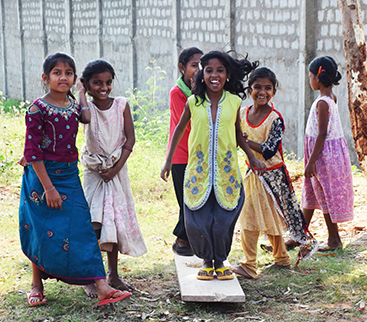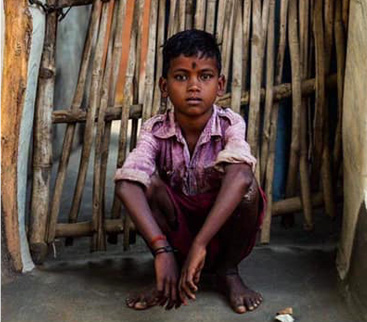
5 Min Read
A Christian Encounter in a Hindu Indian Village with Set Free Alliance
Read More
7 Min Read
Nov 13, 2018
Many of us can’t fathom a reality of child sales, bondage or slavery. Slavery is a thing of the past, right? Unfortunately, not even close. In poverty-ridden villages in India slavery is all too real. Modern day slavery holds millions of children captive, this very moment in India. Children are used for forced labor, sexual exploitation and forced marriage. These children are often brutally punished if their work is not completed fast enough or if they lack compliance. The cycle of child slavery begins and ends with extreme poverty. Many families cannot support themselves or their children and are consequently approached by “buyers” that will buy the children promising to treat them well. These “buyers” lurk around places like bus stations looking for vulnerable children. How do we stop this aggressive cycle?
Many of us know that modern day child slavery exists, but the first step in working to end it is understanding the staggering number of children affected in India.
Child slavery isn’t only happening in India. Take a moment to read through these worldwide statistics. You’ll be surprised!
Unthinkable, right? This reality for so many men, women and children in the world cannot remain unknown. Although child slavery rings exist around the world, the prominence in India is enormous. Resources are not widely available in many parts of India to fight off the cycle of enslaving children. With an impoverished government, caste system and the sheer size of the slavery rings, the cycle of slavery shackles so many through the ever-growing luring methods being used to trap children or entice parents into compliance. We must help to shed light on this darkness and work to bring freedom to all human beings.
Often, child slavery takes shape as bonded labor. If a mother or father is unable to work, has lost their job, or has acquired a debt, a child is often traded for labor to settle the debt. Devastatingly, children are the commodity traded by parents as they are unable to financially support a child due to conditions of extreme poverty. Those held captive in labor bondage do not dare to stop their work for any reason. If work is prolonged, captors add more time to the existing debt, making it that much harder to find a way out. Once sold into bonded labor a child must work to pay off a debt that almost never gets reached. Many times, a family’s debt is passed down for generations of children to bear. Although bonded labor is illegal in India the law is overlooked because of the caste system. Those exploiting the financially vulnerable are often members of the ruling class.
Within Set Free’s network of pastor partners, children are rescued from mines through planned and often unplanned rescues. Many times, these children are surrendered by their captors. Then our network of pastor partners works to find the child’s family and reconnect them. If this is not able to be accomplished, the child is cared for in a church, a rented facility, or central campus. They receive medical care, food, and an education. When the child is old enough they enter job training programs that lead to careers that allow them to be self-sufficient. Incredibly, when these children complete the job training program and enter into a career, they often donate large portions of their salary back to those that saved them to help to save other children just like themselves. These rescued children grow to continue the process of combating child slavery.
Take a minute to read the story of a young boy saved from the grip of slavery through Set Free’s partner pastors:
When young Amar’s* father fell ill, he was unable to work. Amar took on the responsibility of the family and returned to work in his father’s place. When those in charge refused to give equal pay because of Amar’s age, the family was approached by an agent offering the boy work in a stone quarry mine in exchange for Rs.5000 which is the equivalent of roughly $68. The family complied, and Amar was sold. Amar worked 14-hour work days for over four years in torturous conditions. He was often brutally beaten for falling short of his daily work quotas. A few short days after his arrival he was sexually assaulted by the agents in charge. Amar’s despair lasted for many years with seemingly no end in sight. Until a team of four partner pastors organized a rescue plan to save 22 children from the quarry mine in the dead of night. The pastors walked the children for many miles through the dark to safety. The children were welcomed into church homes where each child was nourished until they were healthy once again. Amar was provided with counseling to cope with the traumatizing experiences he faced. After treatment was given for Amar’s physical and emotional needs, he was provided with an academic and spiritual education.
Later, the team of partner pastors located Amar’s family. Amar was welcomed with joyful weeping and clinging embraces from his parents and siblings. He returned home where he now helps his family run a newly established local road-side hotel. Through Amar’s rescue he learned the costly love of Jesus Christ, God’s grace, and the presence of the Holy Spirit. Upon returning home, he has begun to spread the good news of the Gospel with the other children in his village. Amar’s love for God has inspired other children to have faith and trust that God will stay by their side through their darkest hour. Our partner pastors saved Amar, as well as many more from the horrendous grip of slavery. They are now in the arms of those that will nourish them, keep them safe and teach them the love that Christ has for each of them. Amar has seen light in the darkness, felt hope when he thought there was none and is now free. Please join us in the fight to give more children this future.
*name has been changed
Keep educating yourself about the child slavery problem. Understand the significance of working towards a solution. Together we can make a difference! Take the emotions felt after reading these statistics and turn them into a financial gift (of any size). We may not all be able to take physical action locally, but financial action makes the process possible. Just a few dollars can begin a ripple that will spread out far and wide to reach, rescue and secure the future well-being of a child. Set Free is committed to saving all of God’s precious children from a life of enslavement, and with your help, we can move one step closer to doing so.

See how far your dollars go in making an impact in the lives of others.
Follow us on social: